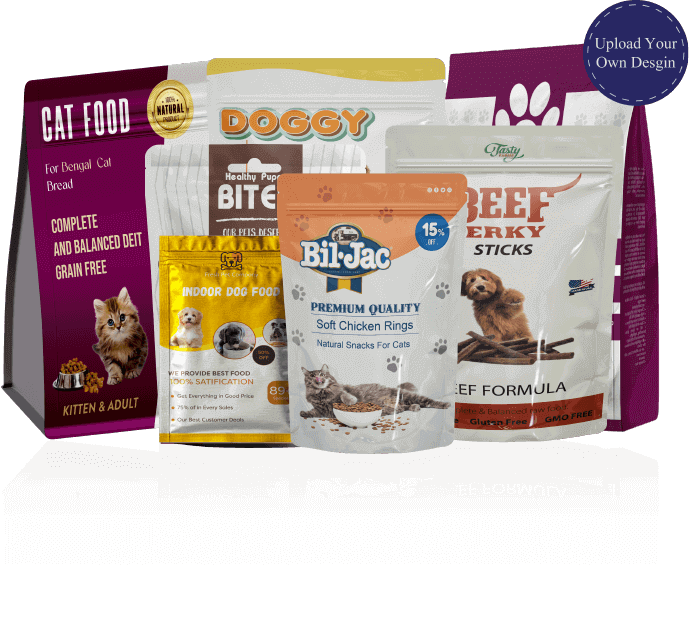1. Understanding the Role of Pet Food Packaging Suppliers
Pet Food Packaging Suppliers play a critical role in the pet food industry by providing packaging solutions that ensure freshness, safety, and appeal. They supply various types of packaging materials, including flexible pouches, rigid containers, and eco-friendly options tailored specifically for pet food products.
2. Types of Pet Food Packaging Suppliers
There are several types of suppliers in the pet food packaging sector, each specializing in different packaging solutions:
- Flexible Packaging Suppliers: These suppliers focus on pouches, bags, and films that are lightweight, resealable, and often made from multiple layers of material to protect contents from moisture and air.
- Rigid Packaging Suppliers: These suppliers offer sturdy containers such as plastic jars, metal tins, or glass jars for dry or wet pet food. Rigid packaging provides excellent protection and extends shelf life.
- Eco-Friendly Packaging Suppliers: With the rising demand for sustainability, many suppliers focus on biodegradable, compostable, or recyclable packaging solutions to meet eco-conscious consumer preferences.
- Printing and Labeling Suppliers: These suppliers specialize in printing and labeling services, ensuring that pet food packaging is visually appealing and complies with regulatory requirements.
3. Key Considerations When Choosing a Supplier
Selecting the right pet food packaging supplier is essential for maintaining product integrity and meeting market demands. Here are some key considerations:
- Quality Assurance: Ensure the supplier adheres to strict quality control standards. Request certifications and conduct audits to verify the safety and reliability of packaging materials.
- Customization Options: Look for suppliers that offer customization capabilities, including size, shape, design, and branding elements that align with your product identity.
- Sustainability Practices: Investigate the supplier’s commitment to sustainability. This includes using eco-friendly materials and reducing waste throughout the packaging process.
- Lead Times and Flexibility: Consider the supplier’s lead times and their ability to handle fluctuations in demand, ensuring timely delivery of packaging materials.
- Cost Competitiveness: While quality is essential, it’s also crucial to compare pricing structures to ensure you get the best value for your investment.
4. Top Pet Food Packaging Suppliers
Here are some reputable suppliers known for their expertise in pet food packaging:
- Sealed Air Corporation: Specializes in a variety of flexible packaging solutions, including vacuum-sealed pouches designed to enhance shelf life and product freshness.
- Mondi Group: Offers a wide range of sustainable packaging solutions, including flexible films, pouches, and rigid containers tailored for pet food.
- Amcor: Known for innovative packaging solutions, Amcor provides flexible and rigid packaging designed to meet the needs of the pet food industry while emphasizing sustainability.
- ProAmpac: A leading supplier of flexible packaging, ProAmpac offers solutions like stand-up pouches and roll stock specifically designed for pet food applications.
- Graphic Packaging International: This company provides sustainable packaging solutions, including paperboard containers and cartons suitable for both dry and wet pet food products.
- Smurfit Kappa: Focuses on sustainable paper-based packaging solutions for pet food, offering various options like corrugated boxes and bags that are eco-friendly and recyclable.
- BWAY Corporation: Supplies rigid containers, including plastic and metal packaging, that are suitable for various pet food products and ensure product safety.
5. Emerging Trends in Pet Food Packaging
Staying abreast of trends can help brands select suppliers that align with consumer preferences and industry innovations:
- Sustainability Focus: As consumers become more environmentally conscious, demand for sustainable packaging options is rising. Suppliers are increasingly offering biodegradable, compostable, and recyclable materials.
- Smart Packaging Solutions: The integration of technology in packaging, such as QR codes or NFC tags, allows consumers to access product information, nutritional facts, and feeding guidelines directly from their smartphones.
- Customization and Personalization: Brands are seeking packaging that reflects their unique identity, leading to an increased demand for customized designs and sizes that cater to specific consumer segments.
- Shelf-Stability Innovations: Advances in packaging materials and technologies are improving the shelf life of pet food, helping brands maintain product quality over extended periods.
- E-commerce Adaptations: As online shopping grows, packaging suppliers are focusing on creating durable and attractive packaging solutions designed for shipping and online sales.
6. Partnerships and Collaborations
Building strong relationships with suppliers can enhance packaging offerings:
- Co-development Projects: Collaborate with suppliers to develop innovative packaging solutions tailored to specific product lines or consumer needs.
- Research and Development: Work with suppliers that invest in R&D to stay ahead of industry trends and develop cutting-edge packaging materials.
- Sustainability Initiatives: Partner with suppliers who are committed to sustainability, allowing you to align your brand with eco-friendly practices.
7. Quality Assurance and Testing
Implementing a robust quality assurance process is essential:
- Material Testing: Suppliers should provide testing for packaging materials to ensure they meet safety standards and are suitable for direct contact with pet food.
- Shelf-Life Studies: Collaborate with suppliers to conduct shelf-life studies, determining how packaging influences product longevity and ensuring freshness throughout its lifecycle.
- Compliance with Regulations: Ensure that suppliers comply with local and international regulations regarding food safety and packaging, such as those set by the Canadian Food Inspection Agency (CFIA) or the U.S. Food and Drug Administration (FDA).
8. Case Studies of Successful Partnerships
- Royal Canin: Collaborated with a packaging supplier to develop packaging that emphasizes the nutritional benefits of their pet food while utilizing sustainable materials to appeal to environmentally conscious consumers.
- Nestlé Purina: Focused on innovative packaging solutions that enhance convenience for pet owners while ensuring product quality and freshness. Their partnership with suppliers emphasizes a commitment to sustainability.
- Blue Buffalo: Worked with suppliers to create visually appealing packaging that reflects their brand values, focusing on natural ingredients and transparency to attract health-conscious consumers.
Selecting the right pet food packaging supplier is vital for brands aiming to enhance product quality, meet consumer demands, and uphold sustainability standards. We partnered with a local company specializing in Custom Packaging Calgary to create unique, branded boxes for our product launch. Understanding the types of suppliers available, considering key factors in the selection process, and staying informed about industry trends will help businesses make informed decisions.
By partnering with reputable suppliers and fostering collaboration, pet food brands can create packaging solutions that not only protect their products but also resonate with pet owners.



